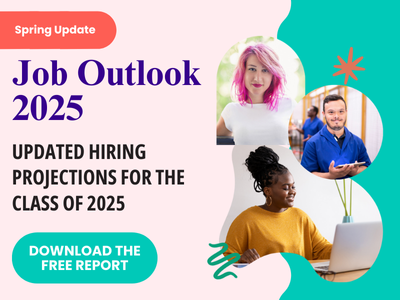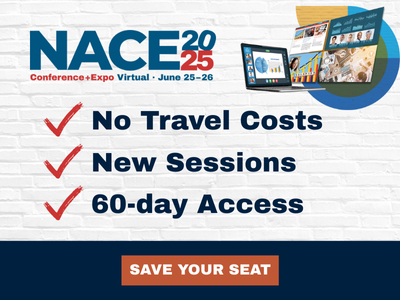The University of California, San Diego (UC San Diego) Career Center developed the Triton Career Readiness Passport to help students launch a personal career journey by answering a simple, but profound, question.
“It was ignited by the belief that every student has a purpose and that their journey begins with the 'why,'” explains Hassan Akmal, UC San Diego’s executive director, career & professional development.
“Students don’t know where to begin. They need a career and life roadmap. Consider all of the emails they receive, the sheer number of events surfacing daily, and all of the activity on a campus as large as ours with more than 140 majors.”
Akmal says that during the 2021-22 academic year, there were 41,885 students from all over the world at UC San Diego.
“Each one of them has a unique story,” explains Akmal, who is also an author, professor, future of work expert, career and life mastery consultant, and TEDx speaker.
“In a rapidly changing world, students often grapple with the daunting task of translating their passions into meaningful work. As Mo Gawdat, the author of Solving for Happy, aptly puts it, 'Happiness is greater when it's shared, and purpose is found when you help others find theirs.’”
To facilitate this translation, the passport is a transformational self-guide to purpose and meaningful work, with an inner journey that Akmal calls “inspirational.” Students are empowered to rewrite their stories as they live them and design their careers and lives.
“This passport was born from the realization that the future of work demands clarity, skills, and personal and professional alignment,” Akmal notes.
“It addresses the obstacle of students feeling lost in the transition from academia to the workforce, bridging the gap between their aspirations and employability. It was rooted in the reality that NACE first shared with us in 2018, in their article: Are College Graduates “Career Ready”?”
The story points to NACE research that shows for every career readiness competency except digital technology, students rated themselves more proficient than employers did.
“This,” Akmal recalls, “was a wake-up call. As a career center, we knew we had to do something to stitch efforts across a large institution into a new fabric that catches and speaks to all students, regardless of background and social capital.”
The primary goal of the initiative is to close the career readiness gap that often separates students and employers in their perceptions of what it means to be career ready.
“We are guiding students to understand themselves better,” Akmal says.
“We aim to close the career readiness gap by offering students a tangible career readiness badge at graduation. It's a testament to their transformative journey, bridging the gap between aspirations and employability in a rapidly evolving world. In essence, we are building a new pathway that connects their dreams to the demands of the future workplace.”
The program is currently in a one-year pilot that began July 1, 2023, after being beta-tested with student employees and career peers.
Program overview
Development of UC San Diego’s Triton Career Readiness Passport was a collaborative effort between students, employers, alumni, faculty, staff, and career experts.
“It is a testament to collective wisdom,” Akmal says.
“It encompasses a diverse range of career-related activities, reflections, and events. From activities going seven-levels deep on students’ ‘why,’ to industry and alumni panels, student employment, networking and informational interviews, and practicing their elevator pitch, there is something interesting for every student, regardless of what career stage they are in. We even incorporated design thinking, beginning with self-empathizing.”
Akmal and his team aligned the career development process with the UC San Diego 12 Career Readiness Competencies and the Co-Curricular Co-Curricular Record (CCR) in partnership with the Teaching + Learning Commons, which is tied to every student's story and transcript.
“Structuring it this way was just half the battle,” he says.
“We also needed to ensure that we were evaluating our students based on progress toward these competencies, not perfection. We are teaching students how to position skills as a new currency in their career positioning and pursuit, which as a result, elevates their personal brand.
“The Triton Career Readiness Passport connects students to the future, AI, and an entrepreneurial mindset, while empowering students to identify skills gaps in their career profile and bridge those gaps with calls to action.”
The program—which is available to all current students and alumni within six months post-graduation—begins with one task that earns a “Triton Stamp,” given for each action item toward completion, which requires a minimum of 15 stamps.
Akmal explains that at this point, students earn unlocks, bonuses, and a UC San Diego Career Center premium leather-embossed passport holder for their real passport.
“It’s a celebration of reinventing themself under the hashtag #UCYou, an online portal for them to report their success stories, which is optional, and update their career victories, which is linked to the First-Destination Survey,” he says.
The CCR highlights student achievements in opportunities beyond the classroom at UC San Diego and the skills developed on an official record. UC San Diego’s 12 competencies are incorporated into engaged learning tools to promote student success and development. One of those tools is the Triton Career Readiness Passport.
The framework for and definitions of UC San Diego’s 12 competencies were created to align with the learning outcomes and competencies of the:
- NACE Career Readiness Competencies;
- Association of American Colleges & Universities (AAC&U) Value Learning Outcomes;
- Council for the Advancement of Standards (CAS) in Higher Education Learning & Development Outcomes; and
- WASC Senior College and University Commission Core Competencies.
The competencies are reviewed on a four-year cycle by the UC San Diego Education Initiative Workgroup.
The Triton Career Readiness Passport's success hinges on personal development, alignment with core competencies, and the capacity to engage students. During their journey, students explore their unique abilities, connect them to purpose, and build confidence to attain Triton Stamps through meaningful experiences.
“These experiences or what’s considered ‘meaningful’ are unique to each individual, so we work closely with them to tailor a personal career and life development plan with the passport as a centering tool toward creating focus. This focus leads to clarity and, eventually, their career and life vision,” Akmal explains.
“Not only are we striving toward the program’s completion from a metrics perspective, but we are also actively listening to our students, meaning we are hearing them and they are informing our direction. We are asking them to tell the story—the story they tell themselves—about themselves. Through self-reflection, prototyping, and iteration, they begin to see themselves as the chief architects of their careers and the designers of their lives.”
Akmal and his team will measure the effectiveness of the Triton Career Readiness Passport by first asking students to articulate their own definition of success. Then, students take a career readiness IQ self-assessment. With this baseline data, the team can evaluate progress via key performance indicators over time, and reassess at graduation.
Team members create targets for each student based on what career development stage they find themselves in. The stages are:
- Assess;
- Develop;
- Immerse; and
- Engage.
“If a student is in the development stage, for example, we might encourage them to identify potential mentors or to build their profile in Tritons Connect, an online community of UC San Diego alumni, students, staff, and faculty,” Akmal says.
“Through this exclusive network, students can find a mentor, post and apply for job opportunities, join a community group, access a directory of Triton community members, and much more. If a student is in the immersion phase, they are likely gaining valuable internship and externship experience, networking, and/or attending conferences.”
Taking a holistic approach, the team doesn’t just count the number of Triton Stamps earned, but also tracks students' personal growth, self-awareness, and career progression.
“We also aim to examine correlations of levels of engagement in the passport to mentorship, employment, and giving back,” Akmal adds.
“Success is achieved when students graduate not only with knowledge, but also with the self-assuredness to navigate the dynamic future of work.”
Overcoming challenges
Akmal points out that raising awareness of the program and bringing it to life has been challenging. Managing collaboration with campus partners was also an essential component.
“We believe in the power of collective impact,” Akmal says.
“They played pivotal roles in shaping and integrating this program into the broader university experience, demonstrating the essence of teamwork.”
One of the keys to the passport program’s successful launch was early buy-in from constituents, including advancement, student affairs, academics, and the chancellor. The passport initiative also paralleled UC San Diego’s Collective Impact efforts, which helped smooth the path for its implementation.
On September 26, the Triton Career Readiness Passport was formally introduced to 1,195 students and stakeholders during an open house.
“The passport received a standing ovation at the end of the day from our students,” he says.
“This was a special moment. I knew that a new tree of success was planted on campus. Every student would participate in nurturing it as it would continue to grow branches, spread more seeds, and create more trees. All of those trees represent the next and new generation of leaders.”
Akmal points out one crucial aspect that cannot be overlooked: the power of continuous learning.
“As the future of work evolves, so must our programs. Let us not forget that the journey is as important as the destination. It's about guiding students to explore their passions, align with their true selves, and become agile in the face of disruption,” he says.
To account for this, he says the passport is “a living document that we will iterate with more qualitative and quantitative data, listening tours, and lessons learned over time. The field of career services is being reshaped as we speak. AI is playing a significant role in this change with data and ethical considerations.
“The future of work is marked by flexibility, continuous learning, and adaptability, and we must evolve ourselves along with our programming in innovative ways to meet the changing needs in this dynamic environment. Success in career services lies in creating pathways for students to realize their potential.”







